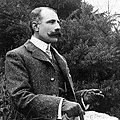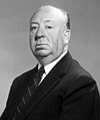The England portal

| |
England is a country that is part of the United Kingdom. It is located on the island of Great Britain, of which it covers about 62%, and more than 100 smaller adjacent islands. It has land borders with Scotland to the north and Wales to the west, and is otherwise surrounded by the North Sea to the east, the English Channel to the south, the Celtic Sea to the south-west, and the Irish Sea to the west. Continental Europe lies to the south-east, and Ireland to the west. At the 2021 census, the population was 56,490,048. London is both the largest city and the capital.
The area now called England was first inhabited by modern humans during the Upper Paleolithic. It takes its name from the Angles, a Germanic tribe who settled during the 5th and 6th centuries. England became a unified state in the 10th century and has had extensive cultural and legal impact on the wider world since the Age of Discovery, which began during the 15th century. The Kingdom of England, which included Wales after 1535, ceased to be a separate sovereign state on 1 May 1707, when the Acts of Union brought into effect a political union with the Kingdom of Scotland that created the Kingdom of Great Britain.
England is the origin of the English language, the English legal system (which served as the basis for the common law systems of many other countries), association football, and the Anglican branch of Christianity; its parliamentary system of government has been widely adopted by other nations. The Industrial Revolution began in 18th-century England, transforming its society into the world's first industrialised nation. England is home to the two oldest universities in the English-speaking world: the University of Oxford, founded in 1096, and the University of Cambridge, founded in 1209. Both universities are ranked among the most prestigious in the world.
England's terrain chiefly consists of low hills and plains, especially in the centre and south. Upland and mountainous terrain is mostly found in the north and west, including Dartmoor, the Lake District, the Pennines, and the Shropshire Hills. The country's capital is London, the metropolitan area of which has a population of 14.2 million as of 2021, representing the United Kingdom's largest metropolitan area. England's population of 56.3 million comprises 84% of the population of the United Kingdom, largely concentrated around London, the South East, and conurbations in the Midlands, the North West, the North East, and Yorkshire, which each developed as major industrial regions during the 19th century. (Full article...)
William III (William Henry; Dutch: Willem Hendrik; 4 November 1650 – 8 March 1702), also known as William of Orange, was the sovereign Prince of Orange from birth, Stadtholder of Holland, Zeeland, Utrecht, Guelders, and Overijssel in the Dutch Republic from the 1670s, and King of England, Ireland, and Scotland from 1689 until his death in 1702. He ruled Great Britain and Ireland with his wife, Queen Mary II, and their joint reign is known as that of William and Mary.
William was the only child of William II, Prince of Orange, and Mary, Princess Royal, the daughter of King Charles I of England, Scotland, and Ireland. His father died a week before his birth, making William III the prince of Orange from birth. In 1677, he married his first cousin Mary, the elder daughter of his maternal uncle James, Duke of York, the younger brother and later successor of King Charles II. (Full article...)
Selected article -
Leeds is a city in West Yorkshire, England. It is the largest settlement in Yorkshire and the administrative centre of the City of Leeds Metropolitan Borough, which is the second most populous district in the United Kingdom. It is built around the River Aire and is in the eastern foothills of the Pennines. The city was a small manorial borough in the 13th century and a market town in the 16th century. It expanded by becoming a major production and trading centre (mainly with wool) in the 17th and 18th centuries.
Leeds developed as a mill town during the Industrial Revolution alongside other surrounding villages and towns in the West Riding of Yorkshire. It was also known for its flax industry, iron foundries, engineering and printing, as well as shopping, with several surviving Victorian era arcades, such as Kirkgate Market. City status was awarded in 1893, and a populous urban centre formed in the following century which absorbed surrounding villages and overtook the population of nearby York. (Full article...)
General images

The National Gallery is an art museum in Trafalgar Square in the City of Westminster, in Central London, England. Founded in 1824, it houses a collection of more than 2,300 paintings dating from the mid-13th century to 1900. The current director of the National Gallery is Gabriele Finaldi.
The National Gallery is an exempt charity, and a non-departmental public body of the Department for Culture, Media and Sport. Its collection belongs to the government on behalf of the British public, and entry to the main collection is free of charge. (Full article...)
Did you know?

- ...that the Rev. Arthur Wagner, the first curate of the Church of St. Paul, Brighton, England, commissioned stained glass windows of his mother, father and aunt for the church?
- ...that Scots' Dike was constructed by the English and the Scots in 1552 to mark the division of the Debatable Lands and thereby settle the exact boundary between the kingdoms of Scotland and England?
- ...that the famed message "England expects that every man will do his duty" is misquoted on Nelson's Column in London?
In the news

- 20 November 2024 – 2024 United Kingdom farmers' protests
- Deputy Prime Minister Angela Rayner dismisses concerns brought on by protests in London from United Kingdom farmers against new agricultural inheritance taxation policies as "scaremongering". (Sky News)
- 19 November 2024 – 2024 United Kingdom farmers' protests
- Thousands of British farmers protest at the Houses of Parliament in London, United Kingdom, against a new inheritance tax on land ownership that includes farms. (Al Jazeera) (BBC News)
- 6 November 2024 – Protests against Donald Trump
- Just Stop Oil protesters spray orange paint on the outside of the American Embassy in London, United Kingdom, following Donald Trump's re-election in the 2024 U.S. presidential election. (The Independent)
- 24 October 2024 – Regulation of electronic cigarettes, Smoking bans in the United Kingdom
- The British government announces that single-use vapes will be banned in England and Wales beginning on 1 June 2025. (BBC News)
- 23 October 2024 –
- Three people are found deceased and seven are hospitalized due to carbon monoxide poisoning at a care home in Swanage, Dorset, England. (Sky News)
Selected featured content
Categories
Selected quotes
| “ | I have seen much to hate here, much to forgive. But in a world where England is finished and dead, I do not wish to live. | ” |
Related WikiProjects
England • Bedfordshire • Brighton • Cheshire • Cornwall • Derbyshire • Dorset • Greater Manchester • Hampshire • Lincolnshire • London • Merseyside • Northamptonshire • North East England • Sheffield • Surrey. Warwickshire • West Midlands • Worcestershire • Yorkshire
Topics
Things you can do

- Please visit the English Wikipedians' notice board and help to write new England-related articles, and expand and improve existing ones.
- Visit Wikipedia:WikiProject England/Assessment, and help out by assessing unrated English articles.
- Add the Project Banner to English articles around Wikipedia.
- Check for announcements and open tasks for ways to improve English related articles.
- Help nominate and select new content for the England portal.
- Requested articles: Charterhouse Lane • Renewable energy in England • Ealing Village
- Expand: Dorothy Boyd • David Troughton
Related Portals
 |
 |
 |
 |
 |
 |
 |
 |
| East Midlands | London | North East | North West | South East | South West | West Midlands | Yorkshire and the Humber |

|

|

|

|

|
| Ireland | Northern Ireland | Scotland | United Kingdom | Wales |
Associated Wikimedia
The following Wikimedia Foundation sister projects provide more on this subject:
-
Commons
Free media repository -
Wikibooks
Free textbooks and manuals -
Wikidata
Free knowledge base -
Wikinews
Free-content news -
Wikiquote
Collection of quotations -
Wikisource
Free-content library -
Wikiversity
Free learning tools -
Wikivoyage
Free travel guide -
Wiktionary
Dictionary and thesaurus

































































![Image 64The Staffordshire Hoard is the largest hoard of Anglo-Saxon gold and silver metalwork yet found[update]. It consists of almost 4,600 items and metal fragments. (from Culture of England)](http://upload.wikimedia.org/wikipedia/commons/thumb/6/60/Staffordshire_hoard_annotated.jpg/120px-Staffordshire_hoard_annotated.jpg)



































